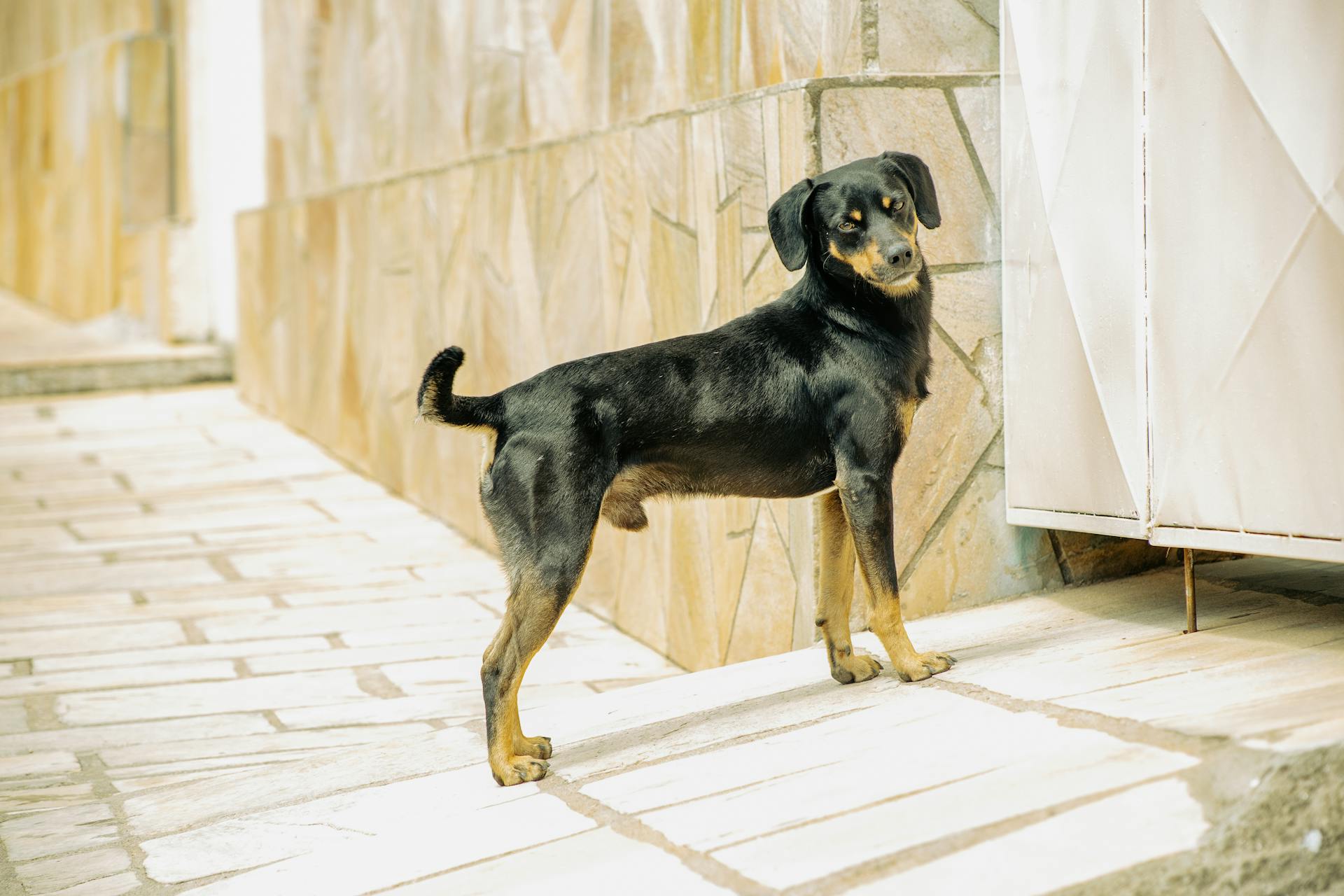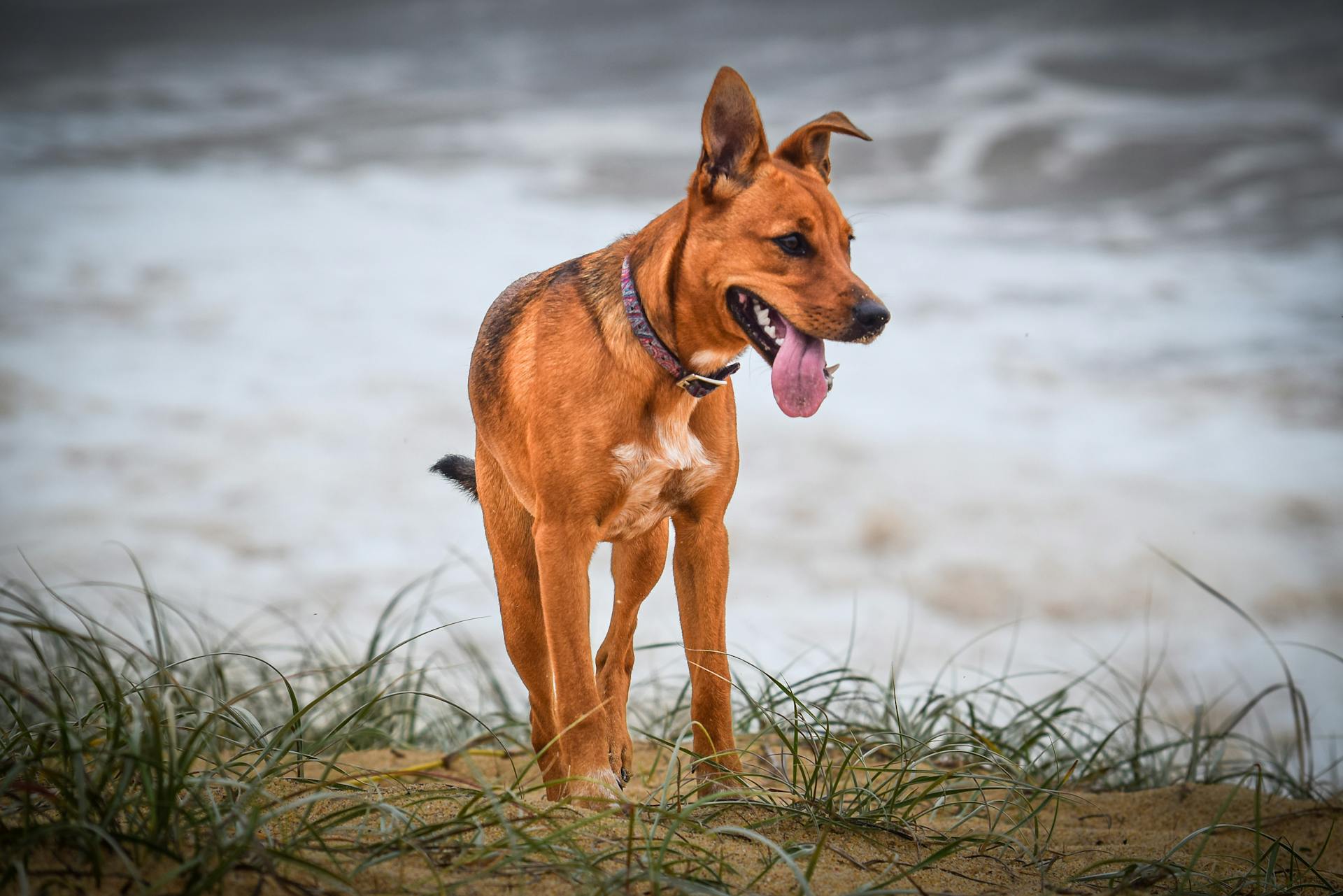
German Pinschers are intelligent and active dogs that thrive on mental and physical stimulation. They require at least 30 minutes of exercise per day.
They're naturally wary of strangers and may be protective of their family, but with proper socialization they can become confident and friendly companions.
To ensure a smooth transition into your home, consider enrolling them in puppy training classes from an early age. This will help establish good behavior and strengthen the bond between you and your dog.
German Pinschers are generally healthy dogs, but like all breeds, they can be prone to certain health issues such as allergies and hip dysplasia. Regular veterinary check-ups can help identify any potential problems early on.
You might like: Do Doberman Pinschers Shed
Traits and Behavior
The German Pinscher is a bold and assertive breed that requires firm training and consistent leadership.
They are highly energetic dogs with high energy levels, needing much more activity than a simple walk around the block.
Early socialization and training are essential to prevent them from taking over your household or becoming bored.
German Pinschers take well to positive reinforcement techniques like play, praise, and food rewards.
If not trained properly, they can be manipulative and run your house if you let them.
They have a strong prey drive and may chase cats or small furry animals outdoors, but some get along with indoor cats if raised together.
The German Pinscher is best suited to families with children 9 years and older who understand how to treat them with respect.
This breed needs daily exercise and dog sports, such as agility, obedience, rally, and tracking.
They can be aggressive towards dogs or other animals they don't know, so a securely fenced yard is crucial.
The German Pinscher should have access to a securely fenced yard but live indoors with their family when home.
Their smooth coat requires weekly brushing to remove dead hair, nail trimming as needed, ear cleaning, and good dental hygiene.
Care and Feeding
The German Pinscher requires 1 to 2 cups of high-quality dog food a day, split into two equal meals.
To ensure your German Pinscher stays happy and healthy, make sure they have access to plenty of exercise, ideally with a yard where they can run around freely. However, even if you live in an apartment or small home, regular walks or playtime will suffice.
German Pinschers love learning new skills and having a job to accomplish, so provide them with interactive toys or consider getting another dog as a companion to keep them busy and satisfied mentally.
Crate training can be beneficial for German Pinschers to prevent accidents around the house and destructive behavior when left alone.
A unique perspective: Doberman Pinscher Images
Nutrition and Feeding
The German Pinscher requires a balanced diet that includes high-quality dog food with natural ingredients and no preservatives or fillers.
Feed your German Pinscher 1 to 2 cups of food per day, split into two equal meals.
Keeping a bowl of fresh water readily available at all times is essential for their overall health.
If your dog is highly active, they may need more frequent feedings to meet their energy needs.
Feeding your German Pinscher twice a day rather than leaving their food out can help prevent overeating and weight gain.
It's best to keep snacks and human food to a minimum to avoid constant craving and unhealthy eating habits.
Tips for Bringing Home a Healthy Puppy
If you're bringing home a German Pinscher puppy, start by finding a reputable breeder through the German Pinscher Club of America website.
Make sure to choose a breeder who has agreed to be bound by the club's Code of Ethics, which prohibits selling puppies to pet stores and outlines responsibilities to dogs and owners.
Consider adopting an adult dog from a shelter or rescue group instead - many health problems aren't apparent in puppyhood, but can be ruled out with an adult dog.
Worth a look: American Kennel Club Lancashire Heeler
A German Pinscher can live up to 12-15 years, so even an adult dog will be with your family for a long time.
Take your new puppy to the veterinarian soon after adoption to spot visible problems and set up a preventive regimen.
Never buy a puppy from a pet store or unverified online source - this increases the likelihood of getting an unhealthy, unsocialized, and difficult-to-house-train puppy.
Make sure you have a good contract with the seller that spells out responsibilities on both sides.
Health and Wellness
German Pinschers are a relatively healthy breed with a lifespan of about 12 to 14 years.
However, they can be prone to certain health conditions like hip issues and eye disease.
One common issue is hip dysplasia, which occurs when the hip socket and thighbone don't fit together properly. This can lead to pain, lameness, and eventually arthritis.
Hip dysplasia is a hereditary issue that may develop in German Pinschers, just like in most large dog breeds.
On a similar theme: Hip Dysplasia Bernese Mountain Dog
The cost to diagnose and treat hip dysplasia can range from $1,500 to $6,000.
Regular veterinary check-ups are essential to identify any potential health concerns early on.
A reputable breeder will be honest and open about health problems in the breed and the incidence with which they occur in their lines.
You should only purchase a puppy from a breeder who can provide written documentation that the parents were cleared of health problems that affect the breed.
Here are some common health issues found in German Pinschers:
- Hip Dysplasia
- Cataracts
- Anxiety
- Separation Anxiety
- von Willebrand's Disease (vWD)
It's essential to brush your German Pinscher's teeth regularly to reduce the risk of dental disease, which is a major threat to this breed.
Dental disease can lead to infection and deterioration of the gums, jaw bone, or teeth.
You might like: Dogo Argentino Teeth
Training and Exercise
The German Pinscher is an intelligent breed and needs constant training to be a well-behaved pet.
They can be very fast learners if you're able to get through to them, but it's essential to challenge them regularly to keep them entertained.
Daily exercise is critical for this breed to ensure optimal health and happiness.
Training

Training is a must for German Pinschers, as they need constant training to be well-behaved pets.
They are intelligent dogs and can learn many skills and tricks with proper guidance.
However, training them takes a firm and confident trainer, preferably with experience with other working dogs.
Early socialization is also crucial to help your German Pinscher become friendly and calm in the presence of other dogs and people.
This can be achieved by inviting friends over and exposing your pup to various public places like dog parks from an early age.
It's essential to maintain a strong command over your pup, as they can grow to be mischievous if not properly trained.
Exercise
The German Pinscher is a high-energy breed that requires regular exercise to stay happy and healthy.
They need daily activity to burn off their excess energy, which can be released through playtime in a secured yard or area.
A big yard is ideal for this breed, as they love running around and playing with toys.
If you don't have a large yard, German Pinschers can still thrive in apartment living if you take them on daily walks.
They're intelligent dogs that need to be challenged regularly, so make sure to include mental stimulation in their exercise routine.
This breed excels at dog sports like obedience, agility, tracking, and rally, as well as classic games like fetch and tug-of-war.
Grooming
The German Pinscher has a short and dense coat that requires minimal grooming.
They come in many colors with variations such as red, stag red (black hairs mixed with red), Isabella (light fawn color), black, blue, tan, and red markings.
Brushing their hair a couple of times a week will help remove any loose hairs or knots. Regular brushing also helps mitigate shedding.
To reduce plaque and tartar buildup, brush your German Pinscher’s teeth about two or three times a week. This will keep your dog's breath smelling fresh.
Recommended read: Will Shiba Inu Hit $1
Trimming your German Pinscher’s nails every couple of weeks is essential to prevent overgrowth or infection. Be careful not to cut too deep, as there are blood vessels in their nails that can start bleeding if you do.
Checking your German Pinscher's ears regularly for redness or a foul odor will help detect ear infections early on.
Frequently Asked Questions
Is a German Pinscher the same as a Doberman?
No, a German Pinscher is not exactly the same as a Doberman, but they share a common ancestry with the Doberman descending from the German Pinscher breed. Despite their similarities, each breed has its unique characteristics and traits.
Is German Pinscher aggressive?
German Pinschers have a strong prey drive and can be aggressive if not socialized properly, making them potentially challenging for inexperienced owners. Proper training and socialization are crucial to bringing out their friendly side.
Do German Pinschers bark a lot?
German Pinschers are prone to excessive barking due to their keen watchdog instincts. If you're considering bringing one home, be prepared for potential nuisance barking if not properly trained or exercised.
Do German Pinschers shed a lot?
German Pinschers are moderate shedders, requiring regular brushing to manage their coat. They shed moderately, not excessively, making them a good choice for some pet owners.
Is a pinscher a good family dog?
Yes, a German Pinscher can be a great family dog when properly trained and socialized. With patience and guidance, they can thrive as a fun and engaging companion for children of all ages.
Featured Images: pexels.com


